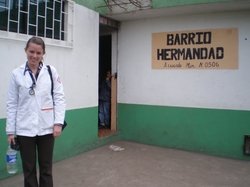Erin McClellan - Fundacion Tierra Nueva
by Erin McClellan
In the summer of 2008, Mallory Delehanty and I spent six weeks working at Fundacion Tierra Nueva health clinic in south Quito, Ecuador. The clinic was founded by a Catholic, Italian Priest in 1970 and offers primary care and specialty care at low cost. It primarily serves the working poor in Quito, and indirectly serves marginalized communities in the surrounding rural areas. The foundation was founded upon the belief that all Ecuadorians should be able to access and afford health care. Therefore, an appointment at the clinic only costs 3 dollars, and patients with or without insurance are welcome at the clinic.

Erin McClellan in front of Fundacion Tierra Nueva health clinic.
During our time at Tierra Nueva, Mallory and I rotated with physicians working with the Community Outreach program at the clinic. The clinic owns and operates a medical van, which houses a dental office, medical office, and pharmacy. One dentist, one primary care physician, one nurse, and a driver operate the van, which visits different barrios situated in hilly, rural areas in and outside of Quito each day. Patients are able to make appointments each week, and walk-ins are also available. The same physician visits each week, and patients are routinely referred to Tierra Nueva for specialty appointments and tests. When they receive results, they visit the van again for follow-up appointments with their physician close to home.
We quickly became good friends with Dr. Chango, the primary physician in the program. Dr. Chango allowed us to help interview patients and perform basic exams. Before stating his diagnoses, he would ask us our opinion and review basic information about different organ systems. Because we were the first-line of medical care in these marginalized communities (and only visited each barrio one time per week), we often saw patients who had delayed medical care for problems such as skin rashes, ulcers, and vaginal infections until they had developed serious complications.
It was very rewarding working with a program that directly and efficiently targets populations in the greatest need. Dr. Chango was an inspirational mentor. He has worked extremely hard to fulfill his goal of reaching these populations, and always greets his patients with a smile. He also works closely with community health workers to efficiently monitor the welfare of each community. On a few occasions, Mallory and I traveled with the community health workers to teach community members about dehydration and nutrition.
Working with the clinic’s community health program allowed us to see parts of Quito and the surrounding area that we would never have seen otherwise. The neighborhoods that we visited were often poorly kept, with dirt roads and garbage strewn about. However, there was always a friendly shop owner willing to sell us a bag of java beans on our snack break. On the van, we met many patients who worked extremely hard each day to stay afloat, and they were very appreciative and respectful of us as medical students. The experience was vastly different from one we would have had in the United States, and it was therefore both refreshing and challenging.
This summer, my eyes were opened to the realities of living and working in a developing nation. I can now visualize how similar and different problems exist around the world, and I look forward to future volunteer and research experiences abroad.
Weill Cornell Medicine Center for Global Health
Center for Global Health
420 East 70th Street, 4th Floor, Suite LH-455
New York, NY 10021
Phone: (646) 962-8140
Fax: (646) 962-0285

